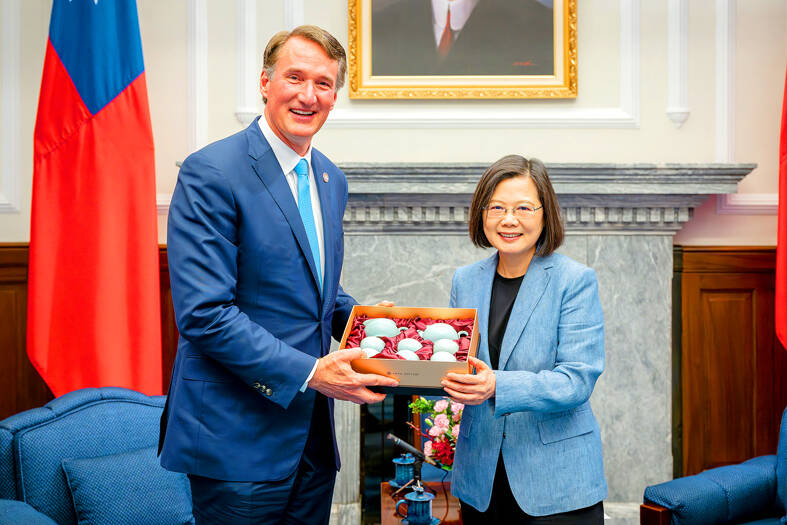A Virginia-Taiwan Trade Office is to open in Taiwan in the hope of boosting economic ties with the nation, visiting Virginia Governor Glenn Youngkin said yesterday.
Youngkin made the announcement during a meeting with President Tsai Ing-wen (蔡英文) at the Presidential Office in Taipei, saying that he had just signed an executive order for the new trade office to be established in Taiwan.
“This is Virginia’s fourth international trade office joining others in Germany, South Korea and Japan, and represents an enduring commitment to fostering collaboration and enhancing our ties with Taiwan,” he said.

Photo: EPA-EFE / Makoto Lin / Presidential Office
The Virginia General Assembly voted in support of a proposal to open a trade office in Taiwan in February after the case gained support from the Senate of Virginia earlier the same month, he said, adding that the decision demonstrates Virginia’s strong commitment to cooperating with Taiwan.
Following the inauguration earlier this year of the Virginia-Taiwan Friendship Caucus, the state would continue to bolster ties with Taiwan, he added.
Virginia is the biggest exporter to Taiwan among all US states, with exports growing 27 percent from 2020 to last year, while it imports more than US$1 billion of products from Taiwan every year, Youngkin said.
Taiwanese businesses in Virginia have demonstrated the strength of the nation’s manufacturing industry, especially semiconductors and electronic technology, he said.
Virginia’s location, solid information and communication infrastructure, and abundant scientific and technological talent make it an ideal location for the semiconductor industry, he added.
The Port of Virginia, which serves as the “heart” of Virginia’s economy, coupled with the new trade office would significantly increase the volume of goods moving into and out of the state, benefiting both Taiwan and Virginia, Youngkin said.
Youngkin is leading an international trade mission to Asia for the first time since taking office in January last year.
He arrived in Taiwan yesterday and is also planning to visit Japan and South Korea today, the Ministry of Foreign Affairs said in a statement.
Tsai thanked the governor for supporting Taiwan, citing the plan to establish a trade office and a resolution passed by the Virginia General Assembly in February supporting the nation’s international participation.
Taiwan and Virginia have long worked closely on trade, education and culture, one example being renewing a memorandum of understanding on language education for the second time in August last year, she said.
The visit could open up more opportunities for the two sides to cooperate in diverse ways, and continue to bolster ties in industry and technology, she added.
Youngkin was also to sign a memorandum of understanding with the Ministry of Economic Affairs, and exchange ideas with the Taiwan External Trade Development Council and businesspeople to explore opportunities for economic and trade cooperation, the Ministry of Foreign Affairs said.
Additional reporting by CNA

AIR SUPPORT: The Ministry of National Defense thanked the US for the delivery, adding that it was an indicator of the White House’s commitment to the Taiwan Relations Act Deputy Minister of National Defense Po Horng-huei (柏鴻輝) and Representative to the US Alexander Yui on Friday attended a delivery ceremony for the first of Taiwan’s long-awaited 66 F-16C/D Block 70 jets at a Lockheed Martin Corp factory in Greenville, South Carolina. “We are so proud to be the global home of the F-16 and to support Taiwan’s air defense capabilities,” US Representative William Timmons wrote on X, alongside a photograph of Taiwanese and US officials at the event. The F-16C/D Block 70 jets Taiwan ordered have the same capabilities as aircraft that had been upgraded to F-16Vs. The batch of Lockheed Martin

GRIDLOCK: The National Fire Agency’s Special Search and Rescue team is on standby to travel to the countries to help out with the rescue effort A powerful earthquake rocked Myanmar and neighboring Thailand yesterday, killing at least three people in Bangkok and burying dozens when a high-rise building under construction collapsed. Footage shared on social media from Myanmar’s second-largest city showed widespread destruction, raising fears that many were trapped under the rubble or killed. The magnitude 7.7 earthquake, with an epicenter near Mandalay in Myanmar, struck at midday and was followed by a strong magnitude 6.4 aftershock. The extent of death, injury and destruction — especially in Myanmar, which is embroiled in a civil war and where information is tightly controlled at the best of times —

Taiwan was ranked the fourth-safest country in the world with a score of 82.9, trailing only Andorra, the United Arab Emirates and Qatar in Numbeo’s Safety Index by Country report. Taiwan’s score improved by 0.1 points compared with last year’s mid-year report, which had Taiwan fourth with a score of 82.8. However, both scores were lower than in last year’s first review, when Taiwan scored 83.3, and are a long way from when Taiwan was named the second-safest country in the world in 2021, scoring 84.8. Taiwan ranked higher than Singapore in ninth with a score of 77.4 and Japan in 10th with

China's military today said it began joint army, navy and rocket force exercises around Taiwan to "serve as a stern warning and powerful deterrent against Taiwanese independence," calling President William Lai (賴清德) a "parasite." The exercises come after Lai called Beijing a "foreign hostile force" last month. More than 10 Chinese military ships approached close to Taiwan's 24 nautical mile (44.4km) contiguous zone this morning and Taiwan sent its own warships to respond, two senior Taiwanese officials said. Taiwan has not yet detected any live fire by the Chinese military so far, one of the officials said. The drills took place after US Secretary